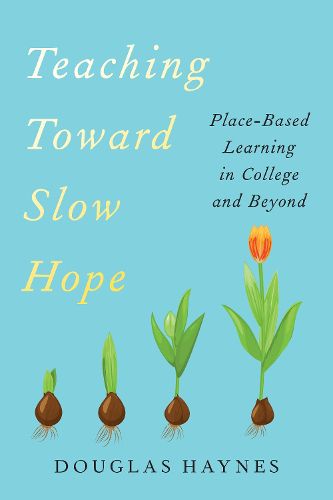Readings Newsletter
Become a Readings Member to make your shopping experience even easier.
Sign in or sign up for free!
You’re not far away from qualifying for FREE standard shipping within Australia
You’ve qualified for FREE standard shipping within Australia
The cart is loading…






Reimagining college as a space for connection, meaning, and collective resilience.
Teaching Toward Slow Hope reveals what happens when higher education dares to become something more than transactional. Rather than positioning education as a financial investment, this book reimagines college as a space where students cultivate the skills and relationships needed for "collaborative survival" in an increasingly unpredictable world. Against a backdrop of mental health crises, ecological instability, and structural inequality, Douglas Haynes traces how students and educators across the Upper Midwest are remaking college into a place for connection, meaning, and collective resilience.
Through on-the-ground reporting and interviews with students, Haynes describes the impacts of dynamic, place-based educational programs. He takes readers on a journey from urban gardens in Milwaukee to restored oak savannas in Madison, and from a community food hub in Kalamazoo to the shore of Lake Superior. At the heart of the programs he visits is a shared commitment to what Haynes calls practices of slow hope: deep listening, reciprocity, collaboration, and embodied learning.
Haynes evokes the experiences of students harvesting native seeds, cooking with local produce, gathering community histories, and learning to see their landscapes anew. Many of these students are first-generation or struggling with anxiety or affording college. From their experiences emerges a deeply human story of transformation based in place, community, and care. Teaching Toward Slow Hope offers educators, administrators, and anyone invested in the future of higher education a powerful new lens for thinking about what college is really for.
$9.00 standard shipping within Australia
FREE standard shipping within Australia for orders over $100.00
Express & International shipping calculated at checkout
Stock availability can be subject to change without notice. We recommend calling the shop or contacting our online team to check availability of low stock items. Please see our Shopping Online page for more details.
Reimagining college as a space for connection, meaning, and collective resilience.
Teaching Toward Slow Hope reveals what happens when higher education dares to become something more than transactional. Rather than positioning education as a financial investment, this book reimagines college as a space where students cultivate the skills and relationships needed for "collaborative survival" in an increasingly unpredictable world. Against a backdrop of mental health crises, ecological instability, and structural inequality, Douglas Haynes traces how students and educators across the Upper Midwest are remaking college into a place for connection, meaning, and collective resilience.
Through on-the-ground reporting and interviews with students, Haynes describes the impacts of dynamic, place-based educational programs. He takes readers on a journey from urban gardens in Milwaukee to restored oak savannas in Madison, and from a community food hub in Kalamazoo to the shore of Lake Superior. At the heart of the programs he visits is a shared commitment to what Haynes calls practices of slow hope: deep listening, reciprocity, collaboration, and embodied learning.
Haynes evokes the experiences of students harvesting native seeds, cooking with local produce, gathering community histories, and learning to see their landscapes anew. Many of these students are first-generation or struggling with anxiety or affording college. From their experiences emerges a deeply human story of transformation based in place, community, and care. Teaching Toward Slow Hope offers educators, administrators, and anyone invested in the future of higher education a powerful new lens for thinking about what college is really for.